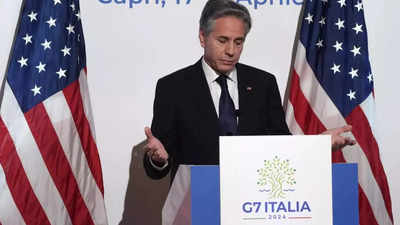- News
- World News
- US News
- US distances itself from attack on Iran, says de-escalation top focus
Trending
US distances itself from attack on Iran, says de-escalation top focus
US Secretary of State Antony Blinken refrained from confirming a reported Israeli attack on Iran on Friday, stating that Washington has not been engaged in any offensive operations. He emphasized the commitment to de-escalating tensions in the region. "I'm not going to speak to that except to say that the US has not been involved in any offensive operations," Blinken said.

(Photo: AP)
US secretary of state Antony Blinken repeatedly declined to confirm a reported Israeli attack on Iran on Friday, saying Washington has not been involved in any offensive operations and it was committed to de-escalating tensions in the region. "I'm not going to speak to that except to say that the US has not been involved in any offensive operations," Blinken said at a news conference capping a gathering of G7 foreign ministers on Italian island of Capri.
"What we're focused on is our work to de-escalate tensions, to de-escalate from any potential conflicts," Blinken said.He would not even directly confirm the Israeli strike, which appeared to be the country's first military response to Iran's attack last weekend, referring instead to "reported events", and he would not say whether the US had been notified in advance of the Israeli action.

Shortly before he spoke, Italy's foreign minister, Antonio Tajani, told reporters that the US had been "informed at the last minute" of the Israeli strike. "But there was no involvement on the part of the United States," Tajani said. "It was simply information which was provided," adding that he believed the G7's collective efforts deserved credit for "the small scale of the event."
Israel, too, said nothing about Friday's drone attacks on the Iranian city of Isfahan. There was also no word from Tel Aviv as to whether further action might be planned. Apart from direct strikes on Iranian territory, it has other ways of attacking, including cyberattacks and strikes on Iranian proxies elsewhere.
In Iran, news reports on Friday's incident made no mention of Israel, and state television carried analysts and pundits who appeared dismissive about the scale. Shortly after midnight, "three drones were observed in the sky over Isfahan. The air defence system became active and destroyed these drones in the sky", Iranian state TV said. By morning, Iran had reopened airports and airspace that were shut during the strikes.
Israeli media avoided quoting Israeli officials directly, instead referring to foreign media reports that cited Israeli sources as confirming Israel was behind the attacks. Some Israelis suggested the aim was to demonstrate the capability to attack without causing harm.
Violence between Israel and Iranian proxies across the West Asia has intensified throughout six months of bloodshed in Gaza, raising fears the longstanding foes' shadow war could spiral into a direct conflict.
"What we're focused on is our work to de-escalate tensions, to de-escalate from any potential conflicts," Blinken said.He would not even directly confirm the Israeli strike, which appeared to be the country's first military response to Iran's attack last weekend, referring instead to "reported events", and he would not say whether the US had been notified in advance of the Israeli action.

Shortly before he spoke, Italy's foreign minister, Antonio Tajani, told reporters that the US had been "informed at the last minute" of the Israeli strike. "But there was no involvement on the part of the United States," Tajani said. "It was simply information which was provided," adding that he believed the G7's collective efforts deserved credit for "the small scale of the event."
A senior US official said on Friday that Israel had notified the US through multiple channels shortly before its attack against Iran. Israel gave the administration an alert moments before its warplanes struck the Iranian embassy complex in Damascus on April 1, but the official said the latest attack was expected given all the warnings Israel had issued during the week. "We were not surprised," said the official, speaking on condition of anonymity. Publicly, Biden officials were tight-lipped about the strike to avoid getting the US pulled into the conflict between Iran and Israel, the official said
Israel, too, said nothing about Friday's drone attacks on the Iranian city of Isfahan. There was also no word from Tel Aviv as to whether further action might be planned. Apart from direct strikes on Iranian territory, it has other ways of attacking, including cyberattacks and strikes on Iranian proxies elsewhere.
In Iran, news reports on Friday's incident made no mention of Israel, and state television carried analysts and pundits who appeared dismissive about the scale. Shortly after midnight, "three drones were observed in the sky over Isfahan. The air defence system became active and destroyed these drones in the sky", Iranian state TV said. By morning, Iran had reopened airports and airspace that were shut during the strikes.
Israeli media avoided quoting Israeli officials directly, instead referring to foreign media reports that cited Israeli sources as confirming Israel was behind the attacks. Some Israelis suggested the aim was to demonstrate the capability to attack without causing harm.
Violence between Israel and Iranian proxies across the West Asia has intensified throughout six months of bloodshed in Gaza, raising fears the longstanding foes' shadow war could spiral into a direct conflict.
End of Article
FOLLOW US ON SOCIAL MEDIA










